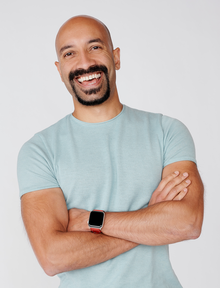
A better funding model for startups
Clearco challenges the status-quo with unbiased investment opportunities for entrepreneurs

Clearco challenges the status-quo with unbiased investment opportunities for entrepreneurs
By Melanie Scott University RelationsFrom about the age of 10, Andrew D’Souza (BASc ’08) began to think of inventive ways to earn money. An early entrepreneur, whose family immigrated to Canada from India, D’Souza started providing his neighbours with services such as paper-delivery, lawn mowing and dog walking. Later, he took on part-time jobs to save for university because he wanted to avoid debt. Today, D’Souza is the co-founder and Executive Chairman of Clearco, a Toronto-based fintech company that has invested $2.2 billion into 5.5 thousand ecommerce companies.

> Andrew D'Souza (BASc ’08)
> Alumnus, Faculty of Engineering
> Co-founder, Clearco
“When choosing a career path, continue to understand what gives you energy and what you find interesting and lean into those things,” D’Souza says. “Ask yourself what is the impact you really want to leave on the world. With entrepreneurship, there are a lot of setbacks, but if you’re doing something because you’re passionate about it, you’ll be a lot more resilient.”
Although D’Souza later became the COO of education startup, TopHat and the president of Nymi, a wearable platform focused on identity and security, it was his time in Silicon Valley that led to the idea behind Clearco.
D’Souza noticed that entrepreneurs in Silicon Valley were advantaged, not because of superior ideas, but because of their location, education and access to investors. He believed there should be a better, more accessible way for startups to get funding. Seeking to level the playing field for entrepreneurs, Clearco pioneered a funding model that removes biases by using data science. Co-founded in 2015 with Michelle Romanow, a Canadian tech entrepreneur known for her season on the cast of CBC’s Dragon’s Den, Clearco’s mission is to open up opportunities for entrepreneurs who operate online, no matter their journey, location or business solution.
Traditional venture capital funding relies on pitches and networking and retains equity, but Clearco uses AI technology to collect data to evaluate a company’s eligibility for investment and does not take ownership or control. Instead, the investment is paid back through a small percentage of the company’s revenue along with a minimum 6 per cent return. Traditional VC models can take many months to make decisions, but Clearco’s algorithm takes less than 20 minutes to determine whether an investment can be made and how much.
Bias in traditional funding models is common, with statistics showing female entrepreneurs draw a very small percentage of venture capital dollars annually. Crunchbase reported that startups with all-female founders drew just 3.4 per cent of all venture capital dollars in the U.S. in 2019, and that declined to 2.4 per cent in 2020. D’Souza suggests these low numbers may be because many female entrepreneurs are solving problems they face in the world, but in pitch meetings men, who may not relate to their ideas, make up the majority of VCs. Clearco, however, funds eight times more women and 30 per cent of its entrepreneurs are People of Colour. They also focus on being accessible to entrepreneurs who may be far from networking opportunities offered in major cities.
“If you only fund entrepreneurs that look a certain way and only invest in certain types of companies, the result is homogeneous companies that benefit a singular group,” D’Souza says. “But if you enable diversity of founders, companies and ideas, the world will look much better. Whether it’s improvements to health care or sustainability solutions, every entrepreneur has their own vision, but they need support and resources to get off the ground.”
Last year, Clearco reached unicorn status, a designation for tech startups that achieve valuations of $1 billion US. The company began by providing accessible funding for startups, but plans to continue expanding what it offers online entrepreneurs, positioning itself as a partner and providing founders with everything they need to succeed.

Read more
Lunaria helps organizations create workplaces where people of all identities can flourish

Read more
Researcher Suzanne Kearns pioneers the Waterloo Institute for Sustainable Aeronautics

Read more
Campus HeForShe #GetFreeTour kick-off outlines how smashing gender inequity begins on campus
The University of Waterloo acknowledges that much of our work takes place on the traditional territory of the Neutral, Anishinaabeg, and Haudenosaunee peoples. Our main campus is situated on the Haldimand Tract, the land granted to the Six Nations that includes six miles on each side of the Grand River. Our active work toward reconciliation takes place across our campuses through research, learning, teaching, and community building, and is co-ordinated within the Office of Indigenous Relations.